A man who once was an avid stamp collector has turned his energies toward a different kind of collectible — surnames. Over the past decade, he has collected more than 200 rare Chinese surnames from friends, relatives, coworkers and even strangers he found in a telephone directory.
Kuo Chih-hsiang (郭智祥) collects surnames by sending an envelope to a person with an unusual surname and have him or her write back with a photocopy of any document that can prove that person’s identification.
Kuo said his surname collection began more than 10 years ago when he asked a Chinese man, Yao Ke (要可), with whom he intended to exchange stamps at the time, to prove his unusual family name. A month later, Kuo received a copy of Yao’s ID card via mail, which inspired him to start collecting rare Chinese surnames.
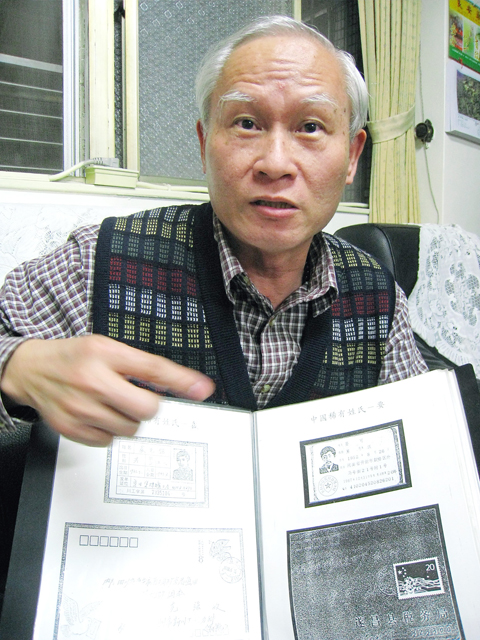
PHOTO: YANG JIOU-YIN, TAIPEI TIMES
At first, Kuo collected unusual surnames from friends who were also stamp collectors by exchanging postal products. Later, he started looking up strange surnames in a telephone directory. However, by doing so, he said he scared many people as he insisted on obtaining photocopies of their ID cards. At long last, he began accepting other types of identification, such as driver’s licenses, student IDs, diplomas, club membership cards, hospital receipts and even bank statements.
To complete the process, Kuo said he would first ask a person with a rare family name for his or her address and then send them a self-stamped envelope. After that, he would either visit in person to pick up the envelope or have the person mail it back.
Some of the rare surnames Kuo has collected include Hu (虎, tiger), Yi (蟻, ant), Shui (水, water), Yun (雲, cloud), Suo (鎖, lock), Dan (但, but) and Mai (買, buy).
Some of the surnames were so rare that the character could not be found on a computer, he said.
Pang Shou-neng (逄守能), a local postmaster in Taichung City, remembered that Kuo had to travel from Taipei to Taichung to meet him to pick up the necessary information for his collection.
“Seeing him so committed, I decided to make friends with him,” Pang said. “But since scams have become so prevalent, if he had asked me for a copy of my ID back then, I wouldn’t have given it to him.”
An elderly woman surnamed Tse (策) told Kuo that very few people had the surname Tse, adding that she was worried it would soon become extinct.
Kuo said this made him realize that his efforts were valuable.
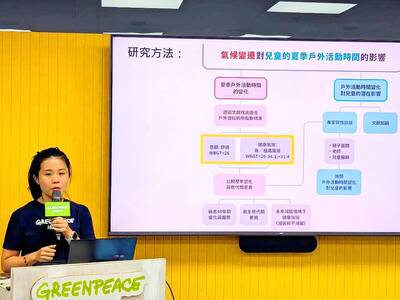
The government should improve children’s outdoor spaces and accelerate carbon reduction programs, as the risk of heat-related injury due to high summer temperatures rises each year, Greenpeace told a news conference yesterday. Greenpeace examined summer temperatures in Taipei, New Taipei City, Taoyuan, Hsinchu City, Taichung, Tainan and Kaohsiung to determine the effects of high temperatures and climate change on children’s outdoor activities, citing data garnered by China Medical University, which defines a wet-bulb globe temperature (WBGT) of 29°C or higher as posing the risk of heat-related injury. According to the Central Weather Administration, WBGT, commonly referred to as the heat index, estimates
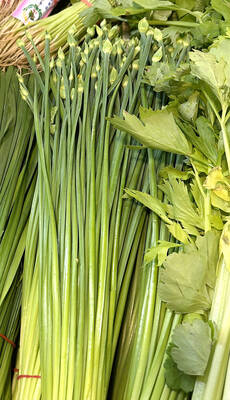
The Taipei Department of Health’s latest inspection of fresh fruit and vegetables sold in local markets revealed a 25 percent failure rate, with most contraventions involving excessive pesticide residues, while two durians were also found to contain heavy metal cadmium at levels exceeding safety limits. Health Food and Drug Division Director Lin Kuan-chen (林冠蓁) yesterday said the agency routinely conducts inspections of fresh produce sold at traditional markets, supermarkets, hypermarkets, retail outlets and restaurants, testing for pesticide residues and other harmful substances. In its most recent inspection, conducted in May, the department randomly collected 52 samples from various locations, with testing showing
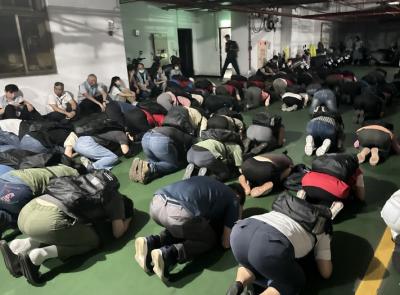
Taipei and other northern cities are to host air-raid drills from 1:30pm to 2pm tomorrow as part of urban resilience drills held alongside the Han Kuang exercises, Taiwan’s largest annual military exercises. Taipei, New Taipei City, Keelung, Taoyuan, Yilan County, Hsinchu City and Hsinchu County are to hold the annual Wanan air defense exercise tomorrow, following similar drills held in central and southern Taiwan yesterday and today respectively. The Taipei Mass Rapid Transit (MRT) and Maokong Gondola are to run as usual, although stations and passenger parking lots would have an “entry only, no exit” policy once air raid sirens sound, Taipei
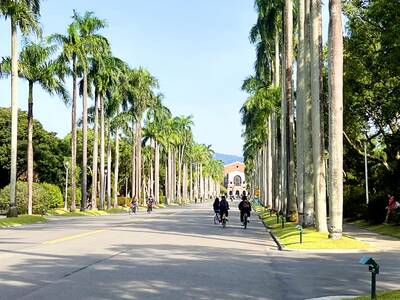
Taipei placed 14th in the Quacquarelli Symonds (QS) Best Student Cities 2026 list, its highest ever, according to results released yesterday. With an overall score of 89.1, the city climbed 12 places from the previous year, surpassing its previous best ranking of 17th in 2019. Taipei is “one of Asia’s leading higher-education hubs,” with strong employer activity scores and students “enjoying their experience of the city and often keen to stay after graduation,” a QS staff writer said. In addition to Taipei, Hsinchu (71st), Tainan (92nd), Taichung (113th) and Taoyuan (130th) also made QS’ list of the top 150 student cities. Hsinchu showed the